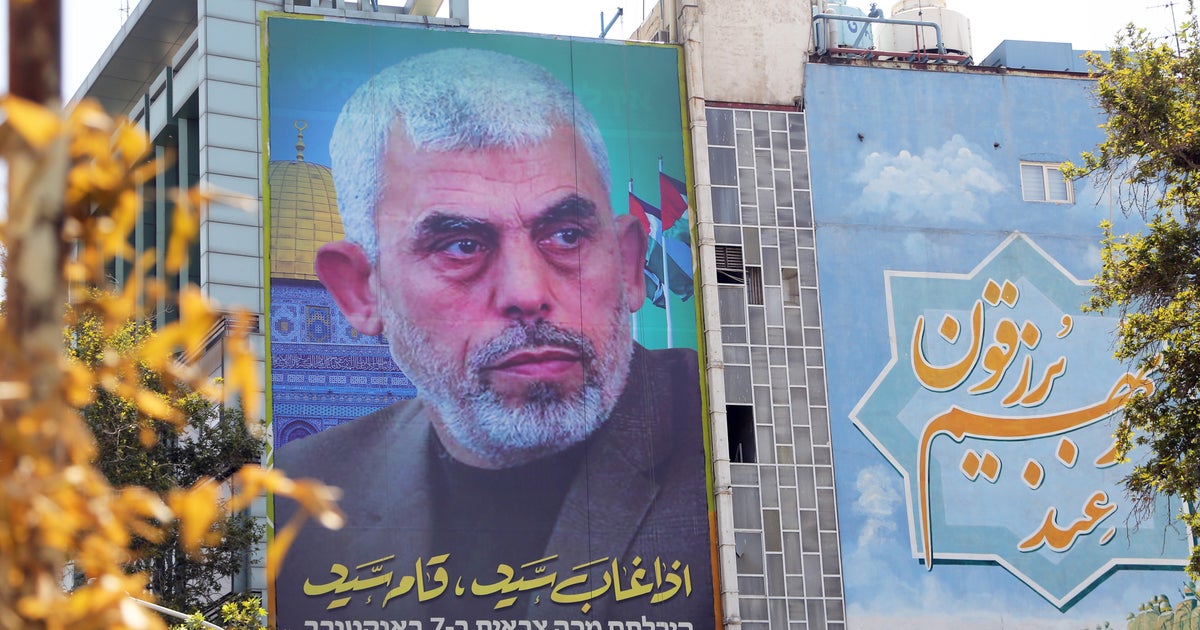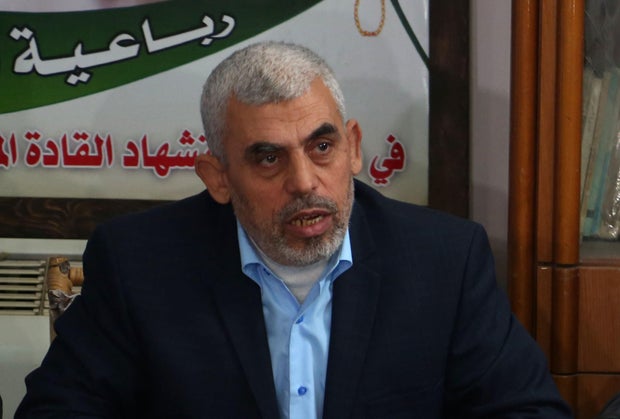CBS News
Israel says Yahya Sinwar, Hamas’ top leader in Gaza, killed in major blow to militant group

Israel’s Foreign Minister Israel Katz said Thursday that Hamas’ top leader and long-time commander in the Gaza Strip, Yahya Sinwar, was killed by troops during an operation in the decimated Palestinian territory.
In a message the Israeli government said was shared with dozens of other foreign ministers around the world, Katz said Sinwar, “who is responsible for the massacre and atrocities of October 7, was killed today by IDF soldiers.”
“This is a great military and moral achievement for Israel and victory for the free world in everything against the evil axis of extreme Islam led by Iran,” said Katz in the statement.
U.S. Rep. Mike Turner, who chairs the U.S. House of Representatives Permanent Select Committee on Intelligence said in a statement Thursday that “justice has been served to Hamas leader Yahya Sinwar,” adding that it was his hope the killing would “result in further progress toward the release of all hostages still held in Gaza, as well as to a ceasefire for Palestinians who have suffered under Hamas’ grip for far too long.”
A photo circulating on social media showed a man resembling the Hamas commander laying dead on a pile of rubble with a gaping head wound, but CBS News could not immediately verify the image. Sinwar had been one of the most wanted figures on Israel’s target list since Hamas launched its Oct. 7, 2023 cross-border terror attack, killing some 1,200 people and taking 251 others hostage.
“In the building where the terrorists were eliminated, there were no signs of the presence of hostages in the area,” the IDF said earlier Thursday.
Majdi Fathi/NurPhoto/Getty
Who was Yahya Sinwar
Sinwar, 61, was accused by Israel of orchestrating the Oct. 7 terrorist attack. He had remained in hiding in Gaza since that massacre was carried out.
He was named as the overall leader of Hamas in August, following the assassination of its former political chief Ismail Haniyeh during a visit to Iran. Before that he had led the group as its top commander in Gaza since 2017. He was considered a ruthless militant commander with close ties to Hamas’ biggest benefactor, Iran.
According to CBS News’ partner network BBC News, Sinwar was born in Khan Younis, in the southern Gaza Strip. His parents had lived in Ashkelon, which is now southern Israel, but they were among the hundreds of thousands of Palestinians displaced in the war that followed Israel’s founding in 1948.
Fatemeh Bahrami/Anadolu/Getty
Speaking during a 2021 news conference in Gaza, after a previous 10-day round of violence between Hamas and Israel, Sinwar told international journalists “the best gift the occupation leaders [Israel] can give me is assassinating me, because since childhood, I was raised in a way that taught me to sacrifice my life for this country.”
“We are not lovers of killing and death, but we are a people who need our rights given back to us,” he said. “If this is secured through popular, nonviolent resistance and international diplomacy then that is preferable, but if we are forced to use the most dangerous means, then we are ready, and our people we will not hesitate to use any means whatsoever to earn their rights.”
Israel’s steady elimination of Hamas leaders
The IDF has killed dozens of commanders and hundreds of fighters belonging to Hamas, long designated a terrorist group by the U.S., Israel and many other countries, since Israel launched its blistering war in Gaza in immediate retaliation for Oct. 7 attack. Prime Minister Benjamin Netanyahu has stressed since the beginning of the war that no senior Hamas figure would escape — and there was none more senior in Gaza than Sinwar.
Haniyeh, who spent decades living in exile in Qatar, was assassinated in Iran’s capital in late July after attending the inauguration of that country’s new president. Israel has not publicly claimed responsibility for the brazen assassination in Tehran, but U.S. officials told CBS News at the time that it was an Israeli strike.
Mohammed Deif, the head of Hamas’ military wing the al-Qassam Brigades, was killed in an airstrike in Gaza in July, according to the IDF.
“There is only one place for Yahya Sinwar, and it is beside Mohammed Deif and the rest of the October 7th terrorists,” IDF spokesman Daniel Hagari said in an interview over the summer. “That is the only place we’re preparing and intending for him.”
Israel’s top coordinator for hostages and the missing told CBS News’ Elizabeth Palmer in September that the Israeli government was prepared to offer Sinwar and his family safe passage out of Gaza if Hamas agreed to relinquish control of Gaza and allow the return of the remaining 101 hostages.
“It would be the end of the war, as [the hostages] will be recovered,” Israeli negotiator Gal Hirsch told CBS News at the time. Sinwar never issued a reply to the Israeli proposal.
Israeli hostage families react
Even before his death was confirmed by the IDF, the Israeli Hostages Families Forum said in a statement that his killing was an achievement, but that only the return of their loved ones could be considered a victory.
“The Hostages Families Forum commends the security forces for eliminating Sinwar, who masterminded the greatest massacre our country has ever faced, responsible for the murder of thousands and the abduction of hundreds,” the group said. “However, we express deep concern for the fate of the 101 men, women, elderly and children still held captive by Hamas in Gaza. We call on the Israeli government, world leaders, and mediating countries to leverage the military achievement into a diplomatic one by pursuing an immediate agreement for the release of all 101 hostages: the living for rehabilitation and the murdered for proper burial.”
Of the 101 hostages still held in Gaza, Israeli intelligence suggests 64 are still alive.
Sinwar’s killing was announced hours after more than a dozen Palestinians, including children, were killed in an Israeli airstrike on a school in Jabalia, in the northern Gaza Strip, that was sheltering displaced people, according to the health ministry in the Hamas-run Palestinian territory.
contributed to this report.
CBS News
Page Not Found: 404 Not Found
The page cannot be found
The page may have been removed, had its name changed, or is just temporarily unavailable.
Be the first to know
Get browser notifications for breaking news, live events, and exclusive reporting.
CBS News
Details on bill to avert government shutdown

Watch CBS News
Be the first to know
Get browser notifications for breaking news, live events, and exclusive reporting.
CBS News
Explosion kills 2 Mexican soldiers in suspected booby trap by drug cartel after troops found dismembered bodies

An improvised land mine apparently planted by a drug cartel killed two Mexican soldiers and wounded five others, Mexico’s defense secretary said Tuesday. Before the blast, the soldiers had discovered the dismembered bodies of three people, officials said.
Gen. Ricardo Trevilla acknowledged that the army had already suffered six deaths from such improvised explosive devices, or IEDs, between 2018 and 2024. But he didn’t specify whether those six had been killed by bombs dropped from drones, or by buried roadside bombs, both of which have been used by gangs in Mexico.
Trevilla said that devices like the one that exploded Monday were “very rustic,” and officials in the past have described them as similar to buried pipe bombs. There was no immediate information on the condition of the five wounded in the attack, which included at least one officer.
Trevilla’s description of the location where the two soldiers died Monday in the western state of Michoacan suggested that it may have been a sort of grisly drug cartel booby trap.
Trevilla said the army sent out a patrol to check on reports that there was an encampment of armed men in a rural area. The armed forces detected an area protected by stockades that appeared to be an encampment, but when soldiers approached in vehicles, they found the trail blocked by logs, so they descended and had to approach on foot.
While approaching, they spotted three dismembered bodies near the encampment, which appeared to be abandoned. But as they drew closer, a buried device exploded and struck the soldiers.
Trevilla blamed the blast on the United Cartels, an umbrella group that includes the local Viagras gang, which has been fighting bloody turf battles against the Jalisco cartel in Michoacan for years.
In August, the Mexican army acknowledged that some of its soldiers have been killed by bomb-dropping drones operated by drug cartels.
Previously, officials have said the army encounters far more roadside bombs than drone-dropped ones.
The Jalisco drug cartel has been fighting local gangs for control of Michoacan for years, and the situation has become so militarized that the warring cartels use roadside bombs or IEDs, trenches, pillbox fortifications, homemade armored vehicles and sniper rifles.
Nemesio Oseguera-Cervantes, also known as “El Mencho,” the leader of the Jalisco cartel, which the officials described as “one of the world’s most violent and prolific drug trafficking organizations.” The United States and the State Department has offered a $10 million reward for his capture.
In the only previous detailed report on cartel bomb attacks in August 2023, the defense department said at that time that a total of 42 soldiers, police and suspects were wounded by IEDs in the first seven and a half months of 2023, up from 16 in all of 2022.
Overall, 556 improvised explosive devices of all types – roadside, drone-carried and car bombs – were found in 2023, the army said in a news release last year.









